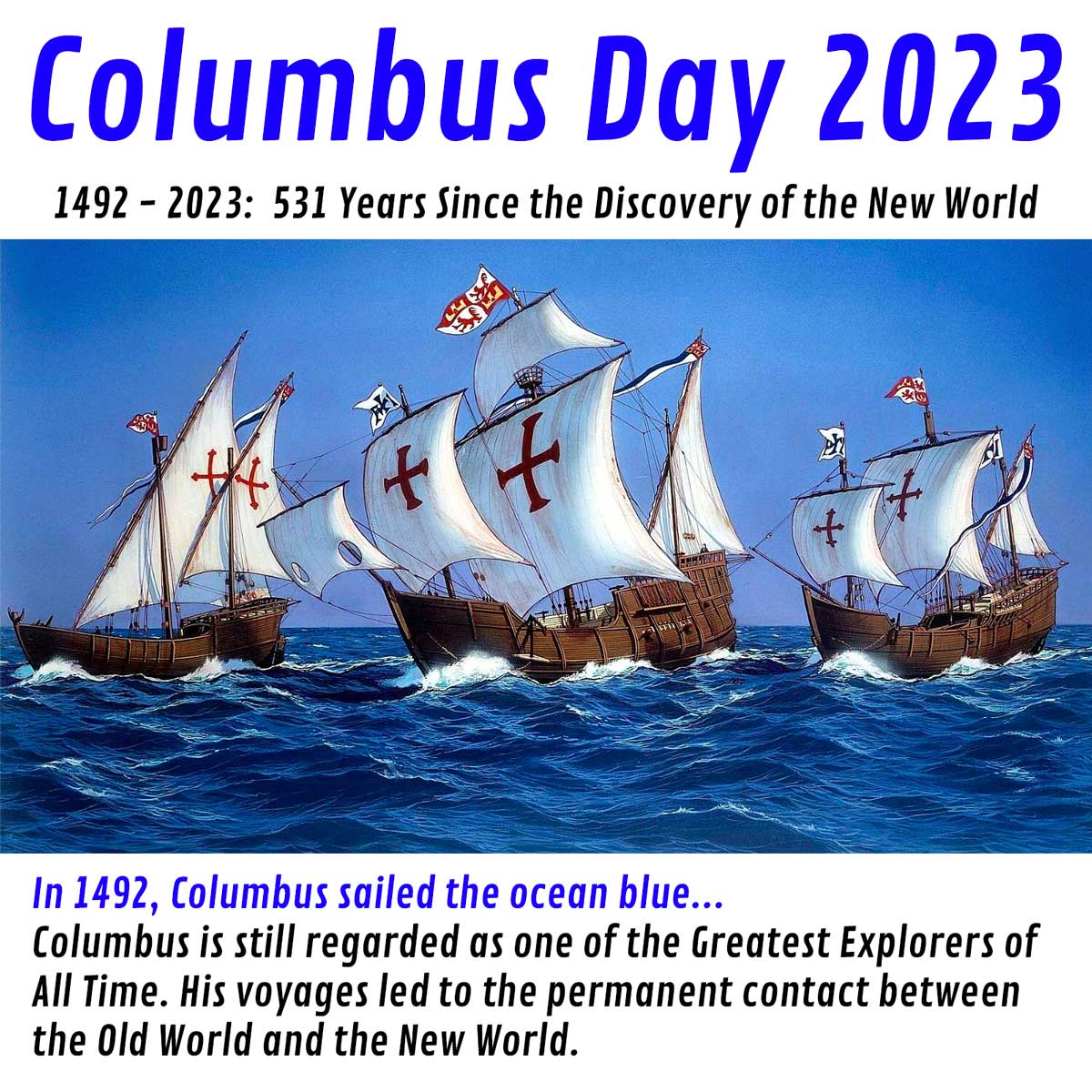Christopher Columbus, an Italian explorer sailing under the Spanish flag, is credited with the discovery of the Americas in 1492 and sets the beginning of the great Columbian exchange. His historic voyage marked the beginning of a new era in world history, connecting the Old World (Europe) and the New World (the Americas). Columbus’ journey not only had profound implications for geography, trade, and culture but also led to the establishment of Columbus Day, a holiday celebrated in the United States. Let’s explore Columbus’ discovery of the Americas and the origins of Columbus Day.
Columbus’ First Voyage
In August 1492, Columbus set sail from Spain with three ships: the Santa Maria, the Pinta, and the Niña. His primary objective was to find a westward route to Asia, but he ended up reaching the islands of the Caribbean, specifically the present-day islands of the Bahamas. Columbus believed he had arrived in Asia, and his initial encounters with the native people he called “Indians” fueled his misconception.
Columbus embarked on subsequent voyages to the Caribbean and the South American mainland. While he never reached the Asian continent, his explorations laid the foundation for further European exploration and colonization of the Americas. His discoveries introduced Europe to the vast riches and untapped resources of the New World, forever altering the course of history.
Columbian Exchange
The Columbian Exchange was a profound and transformative process that occurred as a result of Christopher Columbus’s voyages to the Americas in the late 15th century. It refers to the exchange of goods, ideas, culture, and people between the Old World (Europe, Asia, and Africa) and the New World (the Americas) following Columbus’s arrival in the Caribbean in 1492. This exchange had far-reaching and lasting effects on both sides of the Atlantic.
The Columbian Exchange had several key elements:
- Exchange of Food and Agriculture: One of the most significant impacts of the Columbian Exchange was the transfer of plants and crops between the Old World and the New World. Europe introduced wheat, barley, rice, and sugarcane to the Americas, while the Americas introduced maize (corn), potatoes, tomatoes, peppers, cocoa, and various beans to Europe. This exchange of agricultural products led to increased food production and improved diets on both continents.
- Exchange of Animals: The Columbian Exchange also involved the movement of animals. Horses, cattle, pigs, and chickens were brought to the Americas from Europe. Conversely, the Americas contributed animals like llamas, turkeys, and guinea pigs to the Old World. European horses, in particular, had a profound impact on Native American cultures, transforming hunting and transportation practices.
- Disease Transfer: Unfortunately, the Columbian Exchange also facilitated the transfer of diseases. European diseases such as smallpox, measles, and influenza were entirely new to Native American populations, who had no immunity to them. These diseases caused devastating epidemics, wiping out large portions of indigenous populations in the Americas. But diseases also transferred from the New World back to Europe. Syphilis is one of the most well-known diseases believed to have been introduced to Europe from the Americas. It is caused by the bacterium Treponema pallidum and is transmitted through sexual contact. The first recorded outbreak of syphilis in Europe occurred in the late 15th century shortly after Columbus’s voyages.
- Exchange of Culture and Ideas: The Columbian Exchange was not limited to material goods; it also involved the exchange of ideas, beliefs, and technologies. Europeans brought their knowledge of metalworking, shipbuilding, and advanced weaponry to the Americas, while the indigenous peoples shared their agricultural techniques, medicinal knowledge, and cultural practices with the newcomers.
- Movement of People: Columbus’s voyages also initiated the movement of people between the Old World and the New World. European settlers, along with African slaves, were brought to the Americas to establish colonies and work on plantations. This movement of people had profound demographic and social consequences on both sides of the Atlantic.
- Environmental Impact: The Columbian Exchange had significant environmental impacts as well. The introduction of new plants and animals led to changes in ecosystems, including alterations in food chains and the spread of invasive species.
Overall, the Columbian Exchange had far-reaching consequences, reshaping economies, diets, societies, and ecosystems on both sides of the Atlantic Ocean. While it brought about many positive changes, such as increased agricultural productivity and cultural exchanges, it also resulted in devastating consequences for indigenous populations due to the introduction of diseases and the colonization of their lands. It is a pivotal event in world history that continues to be studied and discussed by historians and scholars today.
Origins of Columbus Day
The origins of Columbus Day can be traced back to the early history of the United States. The first recorded celebration of Columbus’ landing in the Americas occurred in 1792, on the 300th anniversary of the event. However, it wasn’t until the late 19th century that Columbus Day gained widespread recognition.
In 1892, as part of the 400th-anniversary celebrations, President Benjamin Harrison proclaimed Columbus Day as a one-time national holiday. The proclamation aimed to commemorate Columbus’ voyage and promote patriotism among American citizens. The holiday gained further momentum when President Franklin D. Roosevelt declared it a federal holiday in 1937, celebrated on October 12th, the date traditionally associated with Columbus’ arrival in the Americas.
Columbus Day in the United States serves as a day to recognize the contributions of Italian-Americans, who played a significant role in the nation’s development. It is also an occasion to celebrate the spirit of exploration and discovery that Columbus’ voyages symbolize.
Columbus Controversies
Columbus was no angel. He executed both Spaniards and indigenous people under his rule. He took some of the indigenous people or “Indians” as slaves.
So why should we celebrate Columbus Day?
More than anything, Columbus Day celebrates the discovery of the New World and the start of the great Columbian exchange. Sure, there are people that will say Leif Erikson discovered the New World before Columbus. That’s fine, but that didn’t change the world. It was Columbus’ voyage that truly changed the world. Europeans began a mass migration to the Americas after Columbus’ voyages..
Columbus’ voyage and discovery turned Spain into a world superpower. Rival countries including France and England soon created their own colonies in the new world. Our modern existence is a direct result of Christopher Columbus’ voyage.
It’s a massive turning point in world history making Columbus one of the greatest explorers of all time.
As a direct result of Columbus’ discovery, much of the Caribbean and Central and South American was colonized by Spain. This gives us today’s Latin America. Obviously, Miami has been greatly influenced by the Latin American culture.
Think of it this way: The Americas and South Florida would be totally different ethnically and culturally if it was discovered and colonized by Germany or Japan or Morocco.
Bottom Line
Many people want to vilify Christopher Columbus. They want to make him out to be a genocidal maniac like Hitler. He wasn’t. He also wasn’t a saint. Columbus did bad things. Then again, saints weren’t the kind of men you would send to lead sailors half-way around the world to discover an Asian trading route.
But it’s not Christopher Columbus, the man, that we want to celebrate. Rather, we want to celebrate Christopher Columbus’ discovery of the new world. Make no mistake, Christopher Columbus’ discovery has impacted the lives of everyone living in the western hemisphere today.
Columbus’ discovery of the Americas marked a pivotal moment in world history, connecting two previously isolated worlds and reshaping the course of human events. The origins of Columbus Day in the United States stem from a desire to commemorate this historic event and celebrate the contributions of Italian-Americans.
Growing up, we used to get Columbus Day off as a holiday. Sorry kids, but you have to go to school on Columbus Day. However, banks and Post Offices will be closed on Columbus Day as it is still a Federal Holiday. Columbus is still recognized across the United States with many cities named after Columbus including Columbia, South Carolina and Columbus, Ohio. Even our national capital is named after Columbus: Washington, D.C. or District of Columbia.
So whether you’re working, have the day off, or are enjoying the annual Columbus Day Regatta on Biscayne Bay, we want to wish you a Happy Columbus Day.
Offices Closed for Columbus Day:
- Miami-Dade County Offices are closed
- Federal offices are closed
- Post offices are closed
Miami-Dade County Public Schools are open on Columbus Day.






















